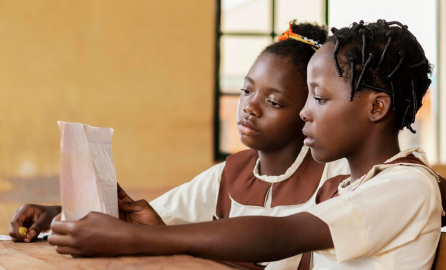Namibia is often held up as Africa’s poster child for progress in education. But while the sector has been well funded for over twenty years and attendance rates meet the requirements of the Millennium Development Goals, learning achievements remain poor.
The great challenge for education in Africa, according to Carol Bellamy, Chair of the Global Partnership for Education, is to look at what is actually going on in school. “Despite great progress in enrolments, we can't assume our work is done simply by having more children in school,” she said at last months’ African Regional Seminar for Health and Education in Brussels.
This rings particularly true in the case of Namibia, which presents something of a conundrum in terms of quality education and poor results.
The Government of Namibia has invested between 20-25% of its budget in education since independence in 1990. Vast improvements have been made in terms of developing a national and regional education system, increasing access and reforming teacher education. Since 2000, the enrolment rate in primary education has increased to over 90%.
But problems remain. Across the school system kids just aren’t getting the results in the classroom. And, in a country bigger than France and Belgium put together, with vast areas of desert, authorities are struggling to provide education access to children in hard-to-reach communities and retain them in the system. There is a 20% repetition rate of pupils in Grade 5 and 50% of Grade 10 pupils fail their exams.
Nathalie Houlou has been Education Programme Officer with the EU Delegation to Namibia for the past six years. She believes that the education system, while being strengthened, is undermined by a series of socio-economic factors that impair child performance. main. Across the school system kids just aren’t getting the results in the classroom. And, in a country bigger than France and Belgium put together, with vast areas of desert, authorities are struggling to provide education access to children in hard-to-reach communities and retain them in the system. There is a 20% repetition rate of pupils in Grade 5 and 50% of Grade 10 pupils fail their exams.
“Education should be approached from a holistic perspective and thus be viewed and tackled across sectors,” she said at the African Regional Seminar for Health and Education, where she presented a case study on Education in Namibia.
“When you look at over 20 years of huge financial investment in the sector and at the necessary ingredients for education to perform, such as the qualification of primary teachers - with Namibia being better endowed than other countries and the provision of textbooks being addressed - you would think that there would be better results,” she continued.
“So you start looking at the living condition of the learners.”
HIV and AIDS remain a heavy burden for the country, with infection rates at around 14%. Grandparents and caregivers are under pressure to cater for numerous orphans. “Nutrition is another issue,” said Ms Houlou. “Many children go to school without having eaten and if they do benefit from the school feeding programme during the week, studies show that they do not eat during the weekend. And obviously during the holidays this is a big issue as the children are in a deprivation state.”
In addition, child abuse and domestic violence represent a serious cause for concern in Namibia. “A child who is going back home from school, being abused or witnessing violence in his household, plus the nutrition issue – if you just look at those three elements there is very little chance for that child to perform,” said Ms Houlou.
“We need to start discussing these socio economic factors. Having an approach that is only focusing on the sector as such is not going to be sufficient,” she stressed.
The government, the EU Delegation and other development partners, including civil society, have reflected on the poor outcome of the education system, and in recent years have changed focus to support the very foundations of the system by engaging with Early Childhood development and Pre-Primary education.
The EU Delegation also supports the Ministry of Education in order to bring systemic changes in terms of quality improvements in the education system.
In addition to direct support to the Government of Namibia, the EU Delegation has initiated a Social Accountability/School Governance project, currently being piloted through the United Nations Children’s Agency, UNICEF, in targeted schools to see how involving all members in the community in the monitoring of education can improve the education service delivery.
“This allows everyone to have a say on whether or not the teachers are there; whether or not the kids are learning,” said Ms Houlou. “This feeds back into our Sector Policy Dialogue so that the government can take measures and take into account what the people think based on the information they are getting with regard to education and children's rights.”
Namibia’s situation provides an example for other countries, where enrolment figures look impressive, but the level of performance is lacking. More than one-fourth of children in sub-Saharan Africa are still not enrolled in school, and millions more drop out of school early, fail to complete a full cycle, or graduate without basic competency in reading and mathematics.
“Education is still the foundation for virtually everything,” stressed Carol Bellamy, “so that when you think of development as a whole, education should not be seen as a sideline but as an anchor to development policy.”
This collaborative piece was drafted with input from Nathalie Houlou, Carol Bellamy, Jacques Malpel and Graca Sousa with support from the capacity4dev.eu Coordination Team.

Log in with your EU Login account to post or comment on the platform.